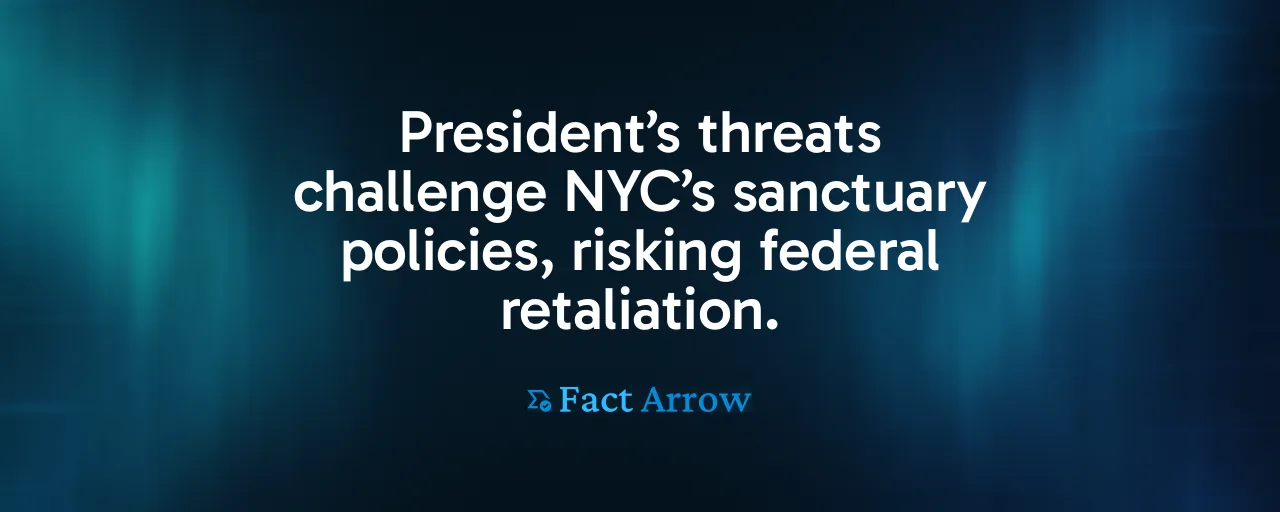A President's Vendetta Ignites Fear
President Donald Trump's recent attacks on New York City's presumptive mayor-elect, Assemblyman Zohran Mamdani, have caused significant alarm throughout the city. Labeling Mamdani a 'Communist lunatic' and threatening to withhold federal funds or even arrest him, Trump claims he's saving New York from progressive ruin. His promises to make the city 'hot' and 'great' again echo campaign-style bravado. Millions of residents face real stakes.
The conflict erupted after Mamdani's unexpected victory in the 2025 Democratic mayoral primary. Trump's rhetoric, amplified through Truth Social posts and Fox News appearances, paints Mamdani's policies as a danger to national security and economic stability. This clash centers on a broader struggle for the right of cities to govern themselves and protect their most vulnerable residents, particularly immigrants.
For New Yorkers, especially the city's 3.1 million immigrants, Trump's threats feel personal. His vows to ramp up federal immigration enforcement and punish the city for its sanctuary policies have stirred fear in communities already wary of federal overreach. New York now faces the challenge of standing firm against a president wielding the full weight of federal power.
The Human Cost of Federal Pressure
Immigrant communities are bracing for impact. Trump's pledge to expand Immigration and Customs Enforcement operations could disrupt lives across the city. Families fear deportations that tear parents from children or force workers into hiding. Studies from the NYC Comptroller show immigrants, regardless of legal status, commit crimes at lower rates than native-born citizens. Despite this, they remain scapegoats in this political conflict.
Beyond enforcement, Trump's threat to cut federal funding, about 7 percent of the city's $112 billion budget, looms large. Schools, hospitals, and public transit rely on these dollars. Losing them could mean fewer teachers, longer emergency room waits, or crumbling subway lines. The pain would fall hardest on low-income residents, many of whom depend on city services to survive.
Advocates for immigrant rights argue that punishing the city for protecting its residents is not just cruel but unlawful. Supreme Court rulings, like Printz v. United States, affirm that the federal government cannot force local police to enforce immigration laws. By threatening to withhold funds, Trump risks violating constitutional protections for local autonomy.
A City's Defiance Takes Shape
New York's leaders are not backing down. Mayor-elect Mamdani, alongside state officials like Governor Kathy Hochul and Attorney General Letitia James, has vowed to fight any federal coercion in court. Past legal battles offer hope: between 2020 and 2022, federal courts blocked Trump's attempts to cut funding to sanctuary cities, citing violations of constitutional spending limits.
Grassroots coalitions are also mobilizing. Immigrant advocacy groups, labor unions, and faith-based organizations are rallying to protect vulnerable residents. Plans are underway to expand city-funded legal defense for immigrants facing deportation, ensuring due process. These efforts reflect a belief that cities have both the right and the duty to shield their people from federal overreach.
Economic diversification is another strategy. By reducing reliance on federal grants through local revenue sources, like progressive taxation or public-private partnerships, the city aims to weather potential funding cuts. This approach aligns with a vision of self-reliance, where New York can govern without bending to Washington's demands.
Lessons From the Past Fuel Resistance
History shows New York's resilience. During Trump's first term, the city faced similar threats over its sanctuary policies. Lawsuits filed by then-Mayor Bill de Blasio and state officials won injunctions against federal grant conditions, preserving billions in funding. Those victories underscore the power of legal resistance against presidential overreach.
Academic research bolsters the city's case. A 2022 Stanford study found no significant crime increase in sanctuary cities compared to others, debunking claims that these policies breed lawlessness. Immigrants also drive economic growth, contributing billions in taxes and consumer spending. Cutting them off would harm not just families but the city's fiscal health.
The past also warns of risks. Trump's threats to arrest local officials, while unprecedented, signal a willingness to test legal boundaries. Federal courts will likely decide the outcome. Delays could strain city budgets and sow fear. New York needs to balance bold defiance with pragmatic planning to protect its residents.
Safeguarding a City's Soul
New York's fight is about more than budgets or policies; it's about identity. The city has long been a haven for those seeking better lives, from 19th-century Irish immigrants to today's asylum seekers. Protecting that legacy means standing up for local control, due process, and the dignity of every resident, regardless of status.
The path ahead requires unity. City leaders, advocates, and residents must work together to defend their rights while preparing for economic fallout. Legal battles, grassroots organizing, and innovative funding will all play a role. The goal is clear: ensure New York remains a place where all can thrive, free from fear of federal retaliation.
As Trump's threats loom, New Yorkers face a defining moment. Their response will shape not just the city's future but the broader fight for local autonomy and justice nationwide. By holding firm, they can prove that even a president's power has limits when met with collective resolve.
